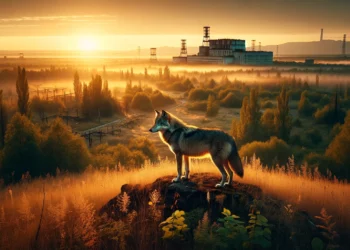If you’ve ever had a dog, you might have heard of canine inflammatory bowel disease (IBD). It’s a chronic alteration of a dog’s gastrointestinal tract with no known cure and limited treatment options. Now, researchers might have found a way forward, using gut microbes found in wild wolves to alleviate this debilitating condition in dogs.

A team at Oregon State University – Cascades found a strain of Paenibacillus bacteria in wolves with encoded genes that would be of value in digesting carbohydrates and could contribute to energy metabolism. It has characteristics of a probiotic — live microorganisms that, when used in the right amounts, provide health benefits to the host.
The study, done in collaboration with Oregon State’s Carlson College of Veterinary Medicine, is a big step towards one day creating a dietary supplement or food additive that could steer the composition of a dog’s microbiome back toward that of the wolf, the researchers said. However, more research will be needed to get there.
“There is no known cure for this ongoing dysbiosis of the gastrointestinal tract, and there are limited options for treatment,” Bruce Seal, study author, said in a news release. “Causes of the condition include an animal’s genetics, environmental factors, the immunological state of the GI tract and, maybe most importantly, an altered gut microbiome.”
Improving the dog’s microbiome
Dogs were the first domesticated animal and shared a common ancestry with the gray wolf. The diet of the modern dog doesn’t reflect the diet of the wolf. For example, the starch in a dog’s diet is resistant to digestion, which can likely have a negative impact on gastric physiology. This can then lead to IBD.
Treatment varies depending on the severity of the disease, with different but limited options. Depending on test results, special diets can be used as a therapeutic trial. Medication can also be given such as antibiotics with an anti-inflammatory effect, as well as supplementation with Vitamin B12 by injection.
In their study, the researchers collected gastrointestinal material from a dead wolf one day after it died in a vehicle related accident. The scientists isolated 20 different gut bacteria that have probiotic qualities, based on genetic analyses. The researchers then conducted whole genome sequencing on a novel Paenibacillus strain.
The bacterium has enzymes such as amylases and cellulases that can digest complex carbohydrates such as starches. It also has gene systems expressing antimicrobials such as bacteriocins and lantibiotics. “Non-toxic, spore-forming bacteria promote anti-inflammatory immune responses in the gut and inhibit pathogen growth,” Seal said.
The researchers are now planning to do whole genome sequencing on four or five other bacterial species among the 20 they isolated. “Taking everything into account, this bacterial isolate could be a potential useful probiotic for domestic dogs,” Seal said. It’s a first step and there’s more work to be done but it could be a valuable solution.
The study was published in the journal Applied Microbiology.






